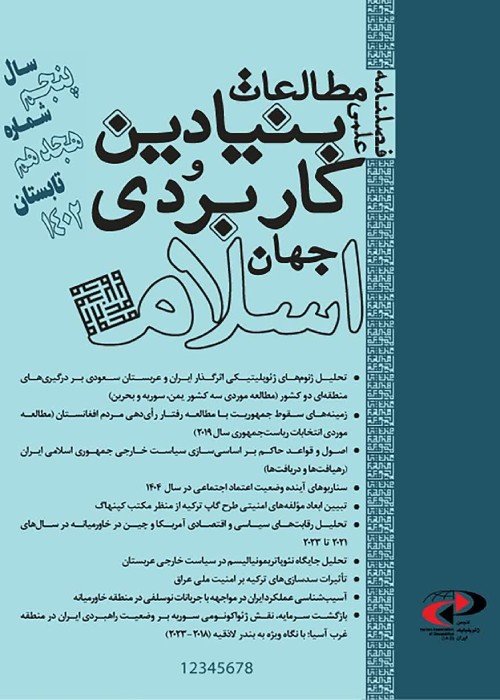A comparative analysis of Iran and Turkey's soft power towards the Syrian crisis
Hossein Rabeieniya , * , Hossein , Harsij
The Syrian crisis has been one of the most complex international issues in the last decade, which has become a source of competition between regional and global powers due to the length of time and the number of effective actors. This country has been one of the strategic goals of foreign policy, on the one hand, as the most focal country of the axis of resistance for Iran, and on the other hand, as a strategic depth in Turkey's Ottomanism policy. In this article, within the framework of the theory of soft power, with a comparative approach, we want to answer the question that what are the commonalities and differences between the two countries of Iran and Turkey in the application of soft power to the Syrian crisis? In response to this hypothesis, the foundation of the soft power of the two countries based on different historical, religious and political values has caused similarities and contradictions in the use of soft power of the two countries after the Syrian crisis. Data from library and documentary sources have been collected and the challenges and opportunities of the two countries' soft power in relation to the Syrian crisis have been compared descriptively and analytically.
The emergence of a process called globalization has led to the emergence of new forms of power and, accordingly, new forms of security interactions. Investigating the nature of power in today's global politics has given birth to a concept called soft power and creating a place for it in international politics. Sources of soft power, unlike hard power which has a military and economic basis, are based on culture and thought. Of course, according to Joseph Nye, soft power is more than cultural power. Soft power relies on both the policy agenda setting method and the power of absorption (Nye, 2008: 151). The Islamic Revolution of Iran has been an effective phenomenon in the Middle East region due to its appeal in its slogans, goals, methods, content and common religious, historical, and regional and international conditions. This revolution caused a kind of Islamic awakening and revival based on the return to the ideology and school of Islam, and especially in the young generation, it created a kind of fascination and return to Islamic thoughts and ideas. An idea that believes that Islam has all human affairs to manage human affairs (Blanks, 1999: 88. Considering that culture is considered one of the most important sources of soft power and religion as the main manifestation of culture is one of the main foundations of the Islamic revolution, the republican system According to its ideological background and geopolitical and geostrategic position, Islamic Iran has huge aspects of soft power.
In Iran's neighborhood, the entry of Islamists into Turkey's political scene turned the country's politicians' eyes from Europe to the Middle East. Turkey correctly realized that decades of looking to the West and over-emphasis on Europe and America have led to a one-sided and unbalanced foreign policy for this country. For this reason, Turkey looked at Islamic countries and the West at the same time (Öztürk and Baser, 2022: 714). Due to Turkey's history, culture and many commonalities with Middle East countries, this country quickly became an active player in the regional arena, and Turkish politicians, by introducing themselves as a successful model of combining religion and democracy in the governance arena, put their efforts in increasing soft power and Its acceptability among the educated youth and the middle class in the Arab countries of the Middle East (Ismaili et al., 2016: 181).
Following the Arab Spring and the instability of the Arab governments, Takfiri groups such as Jabhat al-Nusra and ISIS, by occupying a large part of the Syrian territory and the severe weakness of the government of this country, brought Syria into a crisis that has continued to this day, and at the same time, most of the country's infrastructure has been destroyed. became. This crisis turned Syria into a field of conflict between big and regional powers, including Turkey and Iran, to gain regional influence and hegemony. This question is raised, what are the commonalities and differences between the two countries of Iran and Turkey in the use of soft power in the wake of the Syrian crisis? In response to this hypothesis, the foundation of the soft power of the two countries based on different historical, religious and political values has caused similarities and contradictions in the use of soft power of the two countries after the Syrian crisis. By comparing the opportunities and challenges of using soft power in combination with the hard power of two countries, we try to show which country's strategy in Syria was accompanied by relative success or failure.
It seems that Turkish politicians consider the developments in Syria as an opportunity to expand their influence, increase their role and ultimately, regional hegemony, but not using a principled approach in facing the Syrian crisis, incurring high costs and eroding the political and security crises in Syria, causes disruption of soft power. And the regional position of the Turkish government in the region has been degraded. On the other hand, field realities such as the stability and relative stability of the Syrian government after the country's crisis and the defeat of Takfiri groups show that Iran's approach to regional influence and maintaining strategic depth in Syria has strengthened Iran's position and increased its soft power.
Soft power , Strategic Depth , Iran , Syria , Turkey
- حق عضویت دریافتی صرف حمایت از نشریات عضو و نگهداری، تکمیل و توسعه مگیران میشود.
- پرداخت حق اشتراک و دانلود مقالات اجازه بازنشر آن در سایر رسانههای چاپی و دیجیتال را به کاربر نمیدهد.


